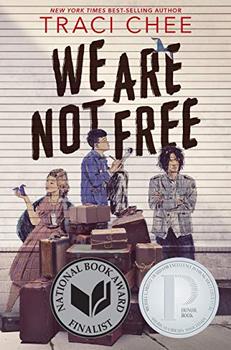Reading Guide Questions

Please be aware that this discussion guide will contain spoilers!
Discussion Questions
- Why do you think the author chose to write each
chapter from a different character's first-person
perspective?
- How is each character's "voice" different from
the others? Some use swear words, while others
are more refined, for starters.
- Which character did you identify with the most,
and why?
- Keiko's chapter when she is eighteen years old is
the only one that's written in the second person:
"This is the last night you'll be together. This is
not the first time you've thought that." Why do
you think the author switched from first to
second person just for this chapter? How does
the change in perspective affect the impact of this
chapter?
- What did you think about Tommy's chapter
toward the end of the book, which is written in
pairs of poems labeled "Japanese" and
"American"? How do the two styles of verses
differ from each other?
- The story in eighteen-year-old Stan's chapter
about the man who was shot and killed by a
guard while walking his dog is based on an
incident that happened at the Topaz camp. How
would you react if you witnessed the shooting?
- Do words matter? There are subtle word
choices in We Are Not Free that show how language evolves over time. Traci Chee explains in
her author's note that she uses the then-accepted
euphemisms "internment" and "evacuation" in
the book even though today, the more accurate
terms are "incarceration" and "forced removal."
She also notes that she uses a term for African
American (black) in the book that is acceptable
today, but was not then. What do you think of
her choices with these terms?
- How would you feel if you and your family and
friends were told that you would need to leave
your homes and businesses and be taken somewhere else to live without knowing where or for
how long? If you were forced to leave your home
and business or farm behind and had to throw
away or sell at low prices most of your belongings, how would your family adapt?
- After the war, when Japanese Americans were
released, some returned to the West Coast but
many went to cities such as Chicago. They still
faced racism, and at first it was difficult to even
find a place to live. How would you react if you
were told you couldn't live or shop someplace
because of your identity?
- How much did you know about the Japanese
American incarceration before reading We Are
Not Free?
- Has what happened to Japanese Americans during WWII happened to other people in the United States, either before or since?
- Can what happened to Japanese Americans happen again to another group?
Writing Activities
- Write a letter (or an email, but pretend you're
hand-writing a letter—don't make it a short text)
to a friend who is far away. Maybe their family moved, or they're in college or the military.
Explain something that happened to you that
made you angry, or sad, or happy. How do you
express emotion?
Write two short scenes from someone else's
perspective: first as someone you know, like a
friend or family member, and then as someone
you don't know but see, like a store clerk or restaurant owner. How do you change your point of
view? What do you need to know about someone
to "become" them?
- Put yourself in the shoes of a young Japanese
American who was born and raised in the United States and now is imprisoned in a camp like
Topaz in Utah. How do you think you would
answer the two controversial questions in the
"loyalty questionnaire" that everyone over the
age of seventeen was required to take? One asked
if you'd be willing to serve in the U.S. military,
and the next question asked if you would "forswear any form of allegiance or obedience to the
Japanese emperor." Could you understand why
the Japanese and Japanese Americans were so
passionately split over these questions?
- Imagine if you were told you had to leave in two
weeks, and you could only take what could fit
into two bags per person or a trunk for your family. (You couldn't take any pets by the way!) You
weren't told where you'd be going, or for how
long, so you don't know whether to take warm-
or cold-weather clothes. Write a paragraph about
the things you would take with you, and why
you chose them.
- Music plays an important role in these young
peoples' lives throughout the book. Songs serve
as vivid memories of happier times, or distractions from current circumstances through
dancing and singing along. It's notable that the
friends' music isn't comprised of traditional
Japanese songs, but the pop songs and big-band
swing music that were popular with all Americans during that time. Name some of the music
that you associate with vivid memories of your
past, and share what that music means to you.
Unless otherwise stated, this discussion guide is reprinted with the permission of Houghton Mifflin Books For Younger Readers.
Any page references refer to a USA edition of the book, usually the trade paperback version, and may vary in other editions.

 Book Reviewed by:
Book Reviewed by:





